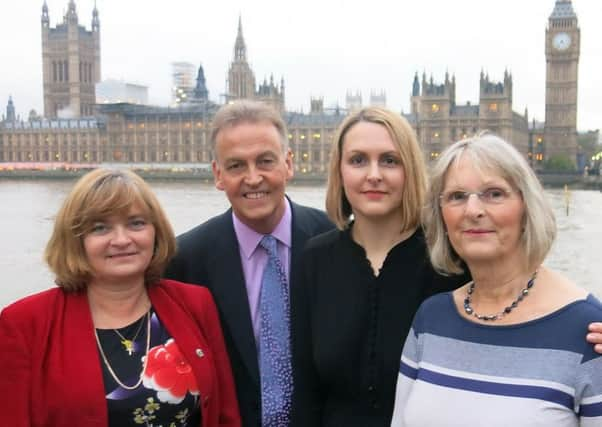Rugby family's brain tumour research fight goes on


The Realf family from Boughton Vale faced heartbreak in August 2014 when Stephen died of a brain tumour aged 26.
On the first anniversary of his death, one of his sisters, Maria Lester, launched a petition calling for more funding.
Advertisement
Hide AdAdvertisement
Hide AdIt was headed ‘Fund more research into brain tumours, the biggest cancer killer of under-40s’.
It also quoted statistics from the charity Brain Tumour Research which said: ‘In 2014, brain tumours received 1.5% (£7.7 million) of the £498 million national spend on research into cancer.
‘At this rate, it could take 100 years to catch up with developments in other diseases.’
The petition saw an outpouring of support. It went past 100,000 names and triggered a response in parliament.
Advertisement
Hide AdAdvertisement
Hide AdThe Petitions Select Committee launched its first-ever inquiry and published a report in late March.
Dad Peter Realf who, along with Maria spoke at the launch of the report, said at the time: “This all-party report is very hard hitting, talking as it does of ‘brain tumour patients have been let down by a lack of leadership from successive Governments’.
“It also states that: ‘Successive Governments have failed brain tumour patients and their families for decades’.”
The next step came on April 18 when a parliamentary debate was held, with Maria, and mum and dad Peter and Liz Realf in attendance.
Advertisement
Hide AdAdvertisement
Hide AdThirty-one MPs, including Mark Pawsey, spoke and Mr Realf said: “I am delighted that the Government has accepted that ‘more needs to be done’ in respect of brain tumours.”
The Government announced in June the setting up of a task and finish working group of experts and charities to find a way forward.
Mr Realf was back at parliament in July for the All-Party Parliamentary Group (APPG) on brain tumours. It coincided with new figures from Brain Tumour Research – which the family continues to work closely with – showing the low percentage spent on research had fallen from 2014 to 2015.
This re-emphasised the need for action and there was another significant moment at the APPG last month when it was announced Mr Realf had been invited to join the task and finish group.
Advertisement
Hide AdAdvertisement
Hide AdHe will be the only lay member of the group. Its second meeting is this month as it works towards producing a report for the health minister by summer.
Mr Realf said: “From our point of view we couldn’t have foreseen the progress made in 2016 and we are really looking forward to building on that and making sure 2017 is the year we get real commitment to investment in brain tumour research from the Government and the charity sector.”
Alongside the setting up of the task force, he said he had seen other evidence of action.
He said: “We’ve heard neurosurgeons say that for the first time in years they have a sense of optimism for progress in research and that brain tumour research has risen up the agenda.”
Advertisement
Hide AdAdvertisement
Hide AdMr Realf said he was grateful to Mr Pawsey and Helen Jones, chair of the the petitions committee who had asked why there was not a representative of the public on the task and finish group – an approach which led to him being invited.
And looking ahead to what 2017 might bring, he said: “There is this kind of optimisim that we really are getting progress.”